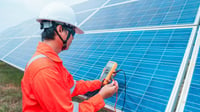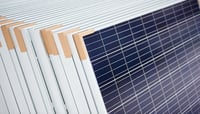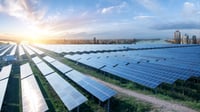As the solar industry matures, new business opportunities arise to address the growing needs of an ‘after-market’ comprising resellers, brokerage firms, third party warranty companies and recycling & refurbishment firms. Such opportunities make a broader array of equipment, like refurbished solar panels and inverters, available to the global market at reduced pricing.
Why buy refurbished solar panels and inverters?
There are a variety of reasons why purchasing refurbished solar equipment may be the ideal choice. Some buyers may be attracted to lower pricing over the latest and greatest technology. Others seek specific replacement parts for older arrays. Still others may want to add onto existing arrays.
The following are real-life scenarios from EnergyBin members, who are buyers and sellers dealing in refurbished equipment trade. EnergyBin is a wholesale solar B2B exchange where solar companies from across the supply chain come together to buy and sell new, used, excess, refurbished and hard-to-find solar equipment.
Purchasing refurbished solar equipment
-
Looking to buy a replacement part: SolarWorld SW Sunmodule 175W – used or refurbished with warranty; needed as soon as possible
-
Need to buy exact replacement: SANYO 210W, VOC 50 Volts, ISC 5.29 AMP panel – one panel needed to replace a damaged part at an existing site; no warranty needed
-
Purchasing panels for an existing array: Suniva 265W module silver frame white backsheet – six panels needed to add onto an existing array; will take used panels without warranty
Selling refurbished solar equipment
-
Refurbished inverters for sale by manufacturer: CPS Inverters 14, 20, 23, 28, 36kW Units – refurbished spares for sale with 5-year CPS service warranty; Price = $1,800; Qty = 100
-
Refurbished inverters for sale by manufacturer: Fronius Symo 10.0-3 208/240 Lite – refurbished by manufacturer; customer ordered wrong inverter; 9-year warranty; Price = $2,000; Qty = 2
-
Refurbished inverters for sale by reseller: SMA SB 2500U – refurbished by reseller with 90-day warranty; Price = $895; Qty = 10
These examples illustrate only a few scenarios that exist in the solar industry today. As solar systems mature, demand will increase for unique replacement parts and add-ons to existing arrays. You can located replacement solar panels and other parts in the secondary market.
The smart way to buy refurbished
When considering the purchase of refurbished solar panels and inverters, buyers should verify the products meet the client’s energy efficiency expectations, have been thoroughly tested and are cost-effective. Further, buyers should take precautionary steps to review resellers before conducting business transactions to reduce their risk of a bad purchase.
Clarify your client’s energy efficiency expectations
Prior to purchasing, buyers should clarify that refurbished equipment meets energy efficiency expectations and is compatible with other components currently in use.
The majority of solar panel manufacturers guarantee peak performance, as defined by no more than a 20% decrease in energy production, for the first 25 years of the panel’s lifespan. A panel will continue to produce thereafter, albeit at a degradation loss of 6-8% year after year.
“Just because a solar panel is outdated or inefficient in its present capacity or use doesn’t mean that it needs to be discarded,” states Bob Shallenberger, VP of Business Development at Interco Trading Company, a solar panel recycler in the U.S. and SEIA member, “Plenty of solar panels that are replaced with more modern, more efficient models can be re-purposed to help those less fortunate domestically and abroad.”
Having a conversation with clients about their energy usage, goals for their solar investment and financial means may open the door for the possibility of purchasing and installing refurbished equipment in place of new equipment.
Some resellers, like You Love Solar, specialize in used solar panels and inverters for resale. Buyers include DIY homeowners and companies looking for hard-to-find replacement parts.
If you are a buyer who doesn't have a professional solar background, you may want to seek the consultation of a PV installer, who can advise whether the refurbished product you are considering buying is compatible with other solar equipment in your system.
Buyers may also want to seek the opinion of a PV recycling company with repair expertise. For a qualified opinion, refer to SEIA’s National PV Recycling Program. SEIA works with a number of recycling companies throughout the U.S., who can advise buyers and resellers on product specifications and provide recycling services for equipment beyond repair.
Test before (and after) you buy
In addition to verifying energy efficiency needs, it is crucial that buyers purchase tested products only. Beware of purchasing old solar equipment that is cheaply priced and has not been tested for safety and performance. Such panels may be considered e-waste, which tends to flood foreign markets where regulations on e-waste are non-existent. In these cases, it may be impossible to dispute a damaged goods purchase after the transaction takes place.
In a recent article published by Forbes on solar panel e-waste, it is reported that “thousands of tonnes of e-waste are falsely declared as second-hand goods and exported from developed to developing countries… Unlike other forms of imported e-waste, used solar panels can enter nations legally before eventually entering e-waste streams.”
To mitigate the risk of purchasing e-waste, buyers should only purchase from resellers who have established their credibility as repairers and/or who guarantee the product is on par with generally accepted safety parameters, such as the IEC 61730 international standard. Test categories of this standard include general inspection, electrical shock hazard, fire hazard, mechanical stress and environmental stress.
Reputable resellers will conduct quality control tests, measure amp and voltage performance, and document the results in writing. Buyers also need to properly test the equipment upon delivery.
For instance, Comet Solar located in Anguilla, a British territory in the Caribbean, uses the Seaward Solar PV150 to run electrical tests and guarantees that U.S. National Electrical Code standards on safety are met prior to selling refurbished solar panels to customers.
Again, ensuring that the part meets the client’s energy performance needs and is safe to commission are key determinants in purchasing refurbished solar equipment.
 Article: How to Inspect and Test Used Solar Panels for Resale
Article: How to Inspect and Test Used Solar Panels for Resale
Conduct a cost analysis
Finally, the buyer should conduct a cost analysis with respect to buying refurbished versus new solar equipment. Several factors should be taken into consideration when assessing the procurement cost of refurbished solar equipment.
As a general rule, Interco Trading Company suggests recycling the panel whenever the cost of refurbishing (including transportation costs, material and labor) exceeds the panel’s market value. Interco further recommends recycling panels that have broken glass, as the cost to refurbish does not make economic sense.
Other factors include the hardware price per quantity needed, shipping and handling (including any import/export tariffs for international sales), financing fees (if purchased on credit), insurance premiums, brokerage fees, depreciation, and maintenance fees over the expected time of use (if warranty is not included).
Buyers without experience in transportation logistics and customs and who are considering purchasing solar equipment located in another country may want to work with a solar broker specialized in international equipment trade. Brokers help to minimize risk and negotiate terms of the transaction.
To learn more about what wholesale solar equipment brokers do, read the article, A Comprehensive Guide to Wholesale Solar Equipment Brokering.
When buyers take the time to conduct thoughtful cost analyses, review safety parameters, and confirm energy efficiency expectations prior to purchasing refurbished solar equipment, they have a clear understanding of their buying needs that will help drive the sales conversation with resellers.
Connect to a reputable reseller
Once the decision has been made to purchase refurbished solar equipment, buyers can take extra steps to verify a reseller’s reputation. By doing so, buyers further reduce their risk of getting stuck with equipment that doesn’t meet expectations, or worse, e-waste.
As a rule of thumb, verify that the company is in fact a company. This step can quickly be done for U.S. companies by visiting the Secretary of State website for the state the business is headquartered in. Search the company name in the business directory listing. If the company is incorporated, the search results will produce details of incorporation and whether the company is in good business standing.
Reputable resellers come with success records and recommendations that can be easily located online. They maintain professional digital appearances (websites, Google business listings and social media profiles). Their customers have written positive reviews about their products and services. They tend to be members of trade associations and/or chambers of commerce. In the U.S., they may also be rated by the Better Business Bureau.
Many resellers list products for sale on third party online marketplaces like eBay and Amazon, clearing houses or exchanges. Buyers can further reduce risk by reviewing the screening parameters such online marketplaces enforce.
Some marketplaces and exchanges are open to anyone and are entirely hands-off with respect to liability. Others, like EnergyBin, are exclusive to registered solar companies who meet member qualifications and who come with business references.
Prior to making a purchase on an online marketplace or auction site, buyers should carefully read the Terms & Conditions.
BEWARE: Many online marketplaces and auction sites will claim to have free registration but then charge transaction fees at the time of sale, which a seller may pass onto the buyer.
Fees schedules should be clearly stated in the Terms & Conditions.
Finally, buyers who are looking for replacement parts for damaged equipment should first check with their insurance agents. Your insurance company may have connections to reputable repairers that work to make repairs in the safest and most cost-effective manner possible.
Build relationships that lead to opportunities
Although it is impossible to eradicate risk, buyers can greatly reduce risk by knowing who they are purchasing from. Connecting to a reputable reseller is like starting a meaningful relationship. Buyers should invest the time to build trust, and when it feels like the right time, take a chance. Meaningful relationships where both the buyer and seller follow through on the terms of agreement open the door to future business opportunities.
You May Also Like:




 The Ultimate Guide to Buying Wholesale Solar Equipment
The Ultimate Guide to Buying Wholesale Solar Equipment